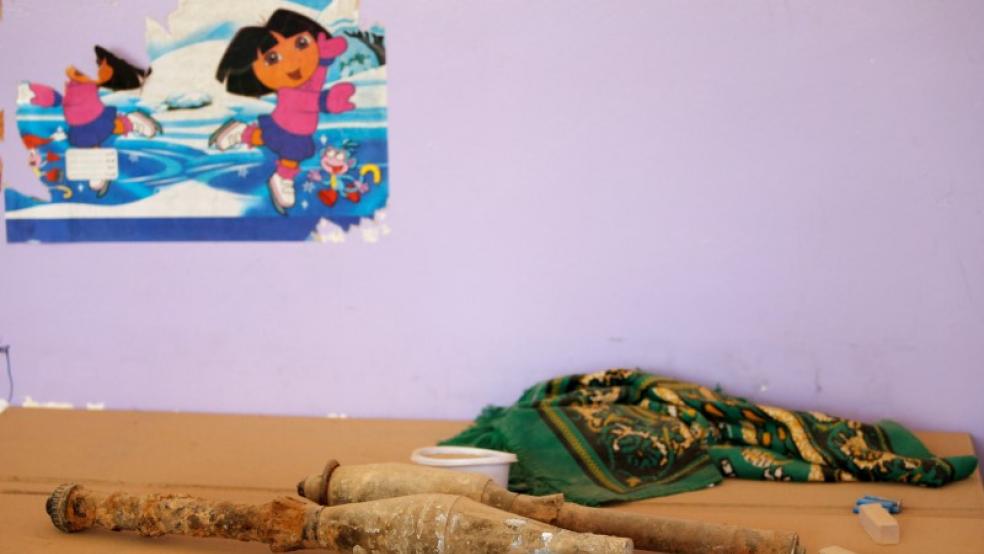FALLUJA, Iraq (Reuters) - Iraq's army sought on Monday to eliminate Islamic State fighters holed up in farmland west of Falluja to keep them from launching a counterattack on the city, a day after the government declared victory over the militants there.
Backed by air strikes from a U.S.-led coalition, Iraqi artillery bombarded targets as its troops closed in on up to 150 insurgents in areas along the southern bank of the Euphrates River, an army officer participating in the operation said.The government's recapture of Falluja, an hour's drive west of the capital, Baghdad, was part of a broader offensive against Islamic State militants, which seized large swaths of Iraq's north and west in 2014, but is now being driven back by an array of forces.Falluja's recovery lent fresh momentum to the campaign to recapture Mosul, Iraq's second-largest city and the biggest anywhere within the jihadists' self-proclaimed caliphate. Prime Minister Haider al-Abadi has pledged to retake Mosul this year.Colonel Ahmed al-Saidi, who participated in Monday's advance, said ground forces were moving cautiously to avoid triggering roadside bombs planted by Islamic State.The holed-up militants "have two options: either they surrender or they get killed. We want to prevent them catching their breath and attacking our forces with car bombs," he said.Saidi said radio intercepts suggested the militants were running out of ammunition and he expected them to fold shortly.The insurgents earlier this month mounted limited resistance to Iraqi forces inside Falluja before scattering after some commanders abandoned the fight, according to Iraqi officials.A Pentagon spokesman told reporters in Washington that while there were still pockets of resistance, Falluja had been cleared and was under the control of the Iraqi government. Captain Jeff Davis said the U.S.-led coalition had carried out more than 100 air strikes on Falluja since the ground operation started."We certainly know that there will be significant challenges that they'll face as they go through and back clear and remove that city of booby traps, IEDs," Davis said, referring to improvised bombs.U.S. Secretary of Defense Ash Carter, said in a statement that the Falluja operation had been "a significant challenge for the ISF and for the coalition", and the task of looking after the displaced residents of Falluja was still ahead. "It is also essential to complete the investigations the government of Iraq has launched to address alleged abuses of civilians", Carter said.The military's swift advance surprised many who anticipated a protracted battle for Falluja, a bastion of Sunni Muslim insurgency where some of the fiercest fighting of the U.S. occupation of Iraq took place in 2004 against Islamic State's forerunner, al Qaeda.ASSESSING THE DAMAGEFalluja was seen as a launching pad for recent Islamic State bombings in and around the capital, and the military campaign was aimed in large part at denying the militants a safe haven nearby.A suicide attack around midnight at a mosque in Abu Ghraib, roughly halfway between Falluja and Baghdad, killed at least 12 people and wounded 32 others. There was no immediate claim of responsibility.Control of Falluja is now shared between the army, elite counter-terrorism forces and federal police. Some fighters from Shi'ite Muslim militias, which have held several outlying areas for months, are also present inside Falluja proper.The army, along with local police, are expected to take full control in the coming days, a military source said.Central districts of Falluja, which in January 2014 became the first Iraqi city to fall to Islamic State, were mostly quiet on Monday as bomb removal operations along roadways and in buildings began in earnest.Military sources said the city had been heavily mined by Islamic State, but the extent of damage to infrastructure and property could not be assessed easily.Dozens of buildings across the city have been set on fire, something government forces blamed mostly on fleeing militants. At least one building, a converted prison in Nazal district, was torched after Islamic State was pushed out.In video published a week ago showing the cages where the militants had allegedly detained Iraqi security officials, the building appeared fully intact. When a Reuters team visited the same site on Monday, soot covered the floor and most rooms were stained black from smoke.A spokesman for Iraq's federal police acknowledged the arson, but said his forces no longer controlled the area. He suggested the destruction was carried out by residents angry about their missing relatives, though most civilians had fled the city by the time the prison was discovered.Some officials estimate that as little as 10 percent of Falluja had been destroyed, comparing that relatively favorably with Ramadi and Sinjar, cities recaptured from Islamic State last year but widely devastated in the process.A spokesman for the governor of Anbar province, where Falluja is located, said the worst damage had occurred in the southern industrial district where Islamic State had assembled car bombs used in attacks in Baghdad.More than 85,000 residents displaced by the fighting in the past month are waiting in government-run camps to return home; at least twice as many people fled Falluja during IS rule.The World Food Programme on Monday expressed alarm at "the extremely dire conditions" of civilians who have overwhelmed the capacity of aid groups. (Additional reporting and writing by Stephen Kalin, additional reporting by Idrees Ali and Phil Stewart in Washington; editing by Mark Trevelyan and G Crosse)Iraqi army closes in on Islamic State militants near Falluja

© Thaier Al-Sudani / Reuters



